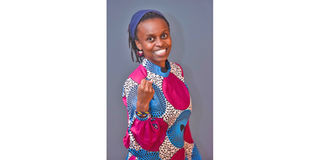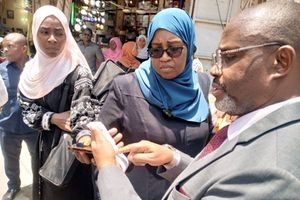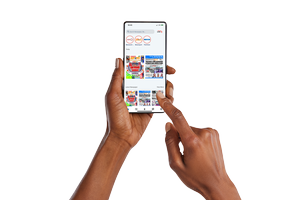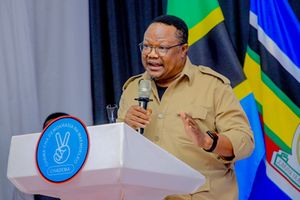Prime
Hyasintha Fitzpatrick: US-based menstrual health advocate helping adolescent girls in rural Tanzania

Hyasintha Fitzpatrick, US-based menstrual health advocate
What you need to know:
- Hyasintha believes that every adolescent girl has the right to receive early menstrual education and choose the menstrual products that suit them, regardless of their geographical location or economic status
When it was unthinkable to speak about menstruation and pads in public, Hyasintha Ntuyeko Fitzpatrick bravely championed the Hedhi Salama campaigns in the country and innovated bamboo-made sanitary pads distributed in Tanzania and South Africa.
Through Hedhi Salama campaigns, Hyasintha was able to educate, create awareness on safe menstruation, and distribute sanitary pads to girls, especially in rural areas where the level of stigma and accessibility of menstrual products was high.
Her commitment to building her social enterprise, Kasole Secrets, has been going on for over a decade.
Nine years ago, Hyasintha was selected to join a presidential fellowship for young African leaders, an American government flagship programme that aimed to develop leadership and entrepreneurship skills.
This programme had a significant contribution to Hyasintha’s leadership skills and opened more doors for her social enterprise as she was able to collaborate with a good number of partners from inside and outside of Tanzania.
Her work impact continues to grow stronger at the national and international levels, and she has become one of the hardest-to-miss thought leaders in the space of menstrual health and hygiene.
Hyasintha was recently married to an American citizen. She continues to run her social enterprise and the Hedhi Salama campaign in Tanzania. As a married woman, she has made Pennsylvania, USA, her home.
Nevertheless, she keeps her focus on Tanzania, where she manages teams and provides technical support for various consultancy projects through her social enterprise.
She has been doing consultancy work for the Ministry of Health, UNICEF and UNFPA for such projects as the development of national menstrual health and hygiene guidelines and their associated toolkits.
She has also taken up the Capacity Building on Entrepreneurship for Out-of-School Adolescents project for eight local government authorities and UNICEF in the Mbeya and Songwe regions.
Another consultancy involves a study on the taxation, compliance, and market of menstrual products in rural Tanzania under OIKOS East Africa and the World Bank.
Hyasintha has dedicated considerable effort over the years to expand her social enterprise and enhance its impact.
Being able to work with reputable organisations as they scale their impact is like a dream come true for her.
Trained as a telecommunication engineer, Hyasintha has channelled her passion into driving positive change in menstrual health and hygiene—an agenda she has steadfastly pursued throughout her career.
As an entrepreneur, she has been offering consultations and training to other entrepreneurs, youth, and organisations on manufacturing, marketing, and compliance for modern reusable pads.
The concept of sewing modern reusable pads was introduced mainly for rural and less privileged adolescent girls who cannot afford to buy disposable pads every month.
Hyasintha pointed out that the use of reusable pads is not a new idea; before technological advancements, our grandmothers and mothers used these reusable pieces of cloth to manage menstruation.
What has changed now in these modern reusable pads is the design and materials that are used to make them.
They are more comfortable, breathable, light, and easy to wash and dry.
Hyasintha believes that every adolescent girl has the right to receive early menstrual education and choose the menstrual products that suit them, regardless of their geographical location or economic status.
Therefore, it is crucial to introduce girls to various types of menstrual products available in the market without stigmatising any particular product, recognising that there will never be one product that fits all girls' needs.
The lack of access to menstrual products has caused some girls to drop out of school, significantly impacting the education and socioeconomic status of women and girls, especially in rural areas.
When it comes to adolescent girls with disabilities, this issue has triple effects on them from all angles.
Hyasintha noted that her core business is selling Glory disposable pads, recognising that this is a viable solution for many urban women and girls who can afford to purchase pads every month.
Hyasintha discovered that the use of reusable menstrual materials is prevalent in rural areas, where many women and girls rely on poor-quality and unhygienic options.
She became aware of this when attempting to introduce Glory Pads to these communities.
Based on this experience, Hyasintha's social enterprise decided to start selling improved materials for making modern reusable pads.
They also initiated training programmes for small-scale entrepreneurs, particularly women and youth, focusing on compliance, safety, and formalisation of their businesses.
This effort aims to promote the sewing and selling of modern reusable pads in rural communities across Tanzania.
Hyasintha mentioned that modern reusable pads are recognised in the country, and regulatory agencies like the Tanzania Medicines and Medical Devices Authority and the Tanzania Bureau of Standards have already established safety and quality standards.
These standards must be followed by anyone involved in importing or locally manufacturing these products.
As the founder of Kasole Secrets and an entrepreneur, Hyasintha has accumulated substantial practical experience over the years.
She has also held various key roles at the national level, enabling her to collaborate effectively with numerous development partners and stakeholders.
Her advocacy has been instrumental in advancing and enhancing menstrual health and hygiene initiatives across the country.
Hyasintha noted that, over the past 14 years of actively working on the menstrual agenda, she has witnessed significant progress.
In the past, there was a pervasive taboo around discussing menstrual health openly; people couldn't even say ‘Hedhi Salama’ publicly due to shame and cultural stigma.
Media outlets were reluctant to cover the topic, considering it private and morally sensitive, contrary to Tanzanian culture.
Now things are very different; everyone is comfortable speaking about Hedhi Salama publicly, funds are allocated and as a nation, we commemorate International Menstrual Health and Hygiene Day each year on May 28, when the Ministry of Health takes the lead on it.
This year, May 28, as in many other years, Tanzania commemorated International Menstrual Health and Hygiene Day at the national level in the Arusha region and Deputy Minister of Health, Godwin Mollel, officiated it.
These commemorations are used as a platform for continuing to create awareness and assessing the impact of stakeholders’ collaborative efforts towards advancing the menstrual health and hygiene agenda in the country.
Hyasintha emphasised that the menstrual agenda is multifaceted, extending well beyond the availability of menstrual products.
It encompasses access to female-friendly toilets, water facilities, and proper disposal infrastructure.
Furthermore, engaging boys and men is crucial for comprehensive solutions to menstrual health and hygiene challenges.
She underscored the necessity of collaborative efforts among stakeholders and government involvement to ensure sustainability in addressing these issues.
Hyasintha said that due to her experience running menstrual projects that are specific to adolescents with disabilities, she realised that different disabilities have different menstrual needs; therefore, active involvement of adolescent girls with disabilities is the way to go towards co-creating solutions that accommodate various types of disabilities.
Hyasintha is proud to be one of the guest lecturers to share her experience and expertise with the world through the lecture series on Menstruation in a Global Context: Addressing Policy and Practice organised by Columbia University and edX, a legacy that she will forever leave in her heart.
Now that she has joined her husband in Pennsylvania, USA, Hyasintha is still relentlessly working remotely and providing technical support whenever needed.
Hyasintha said this work is her passion, and she has fought for it for 14 years; she can’t shut it down just because she is in America.
She said that is the reason she has a team and throughout her career, she has been constantly empowering them and allowing them to step up and make tough decisions on her behalf.
Hyasintha said that she has been travelling all through her work life searching for business opportunities and overseeing projects and her team has been managing without her physical presence.
“What can be different now?” she insists.
Hyasintha is looking forward to continuing to make those long flights across two countries (the USA and Tanzania) to provide any technical support that requires her physical presence in the country.
This is a compromise and a sacrifice she is already making.
Hyasintha said there are no shortcuts in life and it takes time and patience to be able to see the true success of whatever you are doing.
There is no such thing as an overnight success.
It took us 10 years of advocacy for the government to develop national menstrual health and hygiene guidelines and their associated toolkits.
Hyasintha is grateful for having a supportive husband who understands the demanding nature of her work, which often takes her to remote villages in Tanzania with limited internet connectivity.
This sometimes makes telecommunication challenging, but his understanding and support are invaluable to her.
But that is Hyasintha’s husband, Mr Fitzpatrick, who understood early on what kind of woman he was marrying and the impact she has in the communities she works with.
Hyasintha said that, a few months before they got married, she was offered a few important projects of national interest and she decided to consult her husband to see whether she should take them or not.
Mr Fitzpatrick responded with assurance, “Go for it; why not?”
Hyasintha embraced that acceptance and took the job, which pushed her to work till late at night, seven days a week, and sometimes travel back to Tanzania with short notice.
She continues to receive nothing but endless support from her then-fiancé, now husband.
Hyasintha continued to work on those projects even after marriage and her husband continues to offer the same moral support to her.
Hyasintha said her husband always sees the big picture in the work she is doing and even when she thinks of quitting, her husband constantly encourages her to keep pushing despite all the challenges she is facing.
Hyasintha is happy that she always took her husband’s advice and she must admit that working and frequently travelling between countries has never been easy for her at all.




